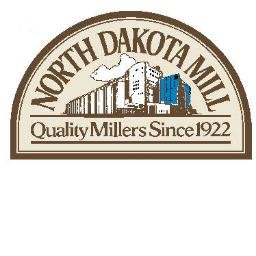
Company Profile
Contact Information
Contact: ND - Grand Forks (BRB supplier)
Phone: (800) 538-7721
Email: Click here to see email.
Website: http://www.ndmill.com
Location
North Dakota Mill
P.O. Box 13078
Grand Forks ND 58208
United States
The North Dakota Mill and Elevator Association began operating October 22, 1922 as a value-added market for wheat produced in North Dakota. In the early 1900’s, the flour mills and grain exchange in Minneapolis were the primary wheat markets for North Dakota farmers and elevators. After freight costs to Minneapolis were deducted from Minneapolis market prices, North Dakota farmers received a low price for their wheat. The North Dakota Mill came into existence to help solve this problem.
The North Dakota Mill facilities include eight milling units, a terminal elevator and a packing warehouse to prepare bagged products for shipment. All Mill facilities are located in Grand Forks and have been paid for from operating profits.
The Mill also has an organic certification for processing organic wheat products.
The North Dakota Mill receives no funds or financial assistance from the State of North Dakota to subsidize the milling operations. Selling value- added milled wheat products to bakery and pasta customers, as well as retail and food service suppliers, generates all operating funds. Over 90% of sales revenues are derived from customers outside the State to create value-added income for the State of North Dakota. The North Dakota Mill supports the local economy with a payroll of $14 million annually.
The North Dakota Mill and Elevator Association is the only state-owned milling facility in the United States. The North Dakota Mill and Elevator Association has, over the years, worked cooperatively with state agencies in promoting North Dakota and its high quality products by participating with and hosting international trade teams and serving as a resource center for training, research and testing.
The North Dakota Mill and Elevator is currently pursuing new marketing strategies to achieve desired profit levels. The new marketing strategies include increasing branded product sales; targeting bakery customers that prefer superior quality flours with excellent uniformity and purity and aggressive marketing of new products at the retail and food service levels.





